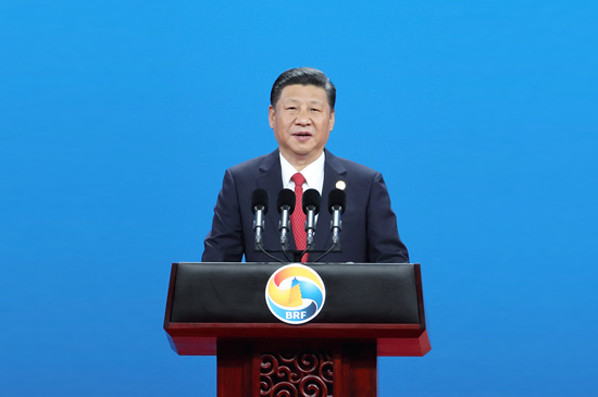Xi's B&R vision: A road to a new world
- By Sajjad Malik
 0 Comment(s)
0 Comment(s) Print
Print E-mail China.org.cn, May 15, 2017
E-mail China.org.cn, May 15, 2017
|
|
|
President Xi Jinping delivers a keynote speech at the Belt and Road Forum for International Cooperation, May 14, 2017. [Photo/Xinhua] |
If implemented in letter and spirit, it has the potential to provide the foundation for a new economic and political international order based on shared prosperity and peaceful co-existence.
More than 1,500 leaders and experts participated in the unique gathering to talk and listen about the mega Road and Belt plan unveiled by Xi in 2013. Some experts might have been skeptical about it at the beginning. But as Xi proudly announced, within four years, the BRI has already become a reality.
Xi, at the start of his speech, delved deep into the past when the ancient Silk Road was used to traverse between east and the west and transport ideas, knowledge, goods and religious beliefs. He said the ancient silk routes united people of various civilizations. It proved that past societies thrived upon mutual learning and cooperation.
He used the success of the old Silk Road to justify his BRI vision, which aims to help everyone. He said the modern world is far more advanced and diversified, but it also needs more peace, prosperity and multilateral cooperation.
Xi's address highlighted that the BRI is not empty rhetoric. Facts show a phenomenal spirit of cooperation among various countries, which have become part of the initiative. The president also supported this argument with solid data.
China signed cooperation agreements with over 40 countries and international organizations, as well as executing a framework of cooperation on production capacity with more than 30 countries. It also plans to launch Belt and Road cooperation initiatives on trade connectivity with some 60 countries and international organizations.
Talking about the connectivity, Xi mentioned the building of the Jakarta-Bandung high-speed railway, China-Laos railway, Addis Ababa-Djibouti railway and Hungary-Serbia railway, and the upgrading of Gwadar and Piraeus ports. He said it was just the tip of the iceberg as more projects were coming up.
Other infrastructure network and economic corridors like China-Pakistan Economic Corridor, China-Mongolia-Russia Economic Corridor and the New Eurasian Continental Bridge worth billions of dollars are also being implemented. Only the investment on the China-Pakistan Economic Corridor has crossed $55 billion.
A key component of BRI is trade facilitation and investment. Xi noted that since 2014, trade between China and other Belt and Road countries exceeded $3 trillion dollars. China's investment in these countries also crossed $50 billion.
The additional benefits of the initiative are that Chinese companies have set up 56 economic cooperation zones in over 20 countries, generating some 1.1 billion dollars of tax revenue and 180,000 jobs.
It is a truly massive developmental effort and all those who were skeptical in 2013 and are still sitting on the fence should know that the BRI is a game-changer.
Xi's speech proves China's commitment as it is pumping vast capital and other resources for the success of BRI. The Asian Infrastructure Investment Bank provided 1.7 billion dollars of loans for nine projects in Belt and Road countries, while the Silk Road Fund has made 4 billion dollars of investment. Xi also announced RMB 100 billion of investment for the Silk Road Fund.
The address not only showed the shiny side of the undertaking but also the challenges ahead. Xi said tackling issues of economic growth, trade imbalances, ending poverty, fighting terrorism and improving governance were some the hurdles that should be scaled by joint efforts.
He also touched on the peace dividends and said that the Belt and Road is not just a trading route but also a road to global peace because its success depends on peaceful cooperation. Thus, by default, it has the potential to shape up a new world order based on cooperation and not confrontation.
BRI has also been termed as a road to global prosperity, as its aims of interconnected development deliver benefits to all by deepening industrial cooperation and brining focus on the big projects.
Xi also plans to make the BRI as a road to innovation. Elaborating it further he said that innovation is important for development and Belt and Road needed innovation more than anything to thrive. Innovation means making physical roads and digital highways be leveraging science and new technologies for development.
Xi's speech has provided the roadmap for grand global economic development and peaceful co-existence. It is true that the final goalposts are still far way, but as Xi said, the BRI has taken the “solid first step” and now there is no looking back.
Sajjad Malik is a columnist with China.org.cn. For more information please visit:
http://www.china.org.cn/opinion/SajjadMalik.htm
Opinion articles reflect the views of their authors, not necessarily those of China.org.cn.







Go to Forum >>0 Comment(s)